"It's a perfect garden. We've had a growing season, and I've learned a huge amount. Things are happening all around; the soil's rich, there's literally an abundance of life, and we can market new and unique products together. I'd do it again in a heartbeat," begins Ruud Batist.
It is clear that by establishing his new flower nursery, The Flowergarden, this spring, Ruud rediscovered the joy of cultivation. That was lacking a bit in recent years. He and his brother have spent the past 16 years growing gerbera in a modern greenhouse in the Netherlands, using the most modern growing techniques. That is, on substrate and in monoculture, and recently also using biology, but with no natural balance, so to speak. It is not so easy to put your finger on exactly what that is. Be that as it may, Ruud was unhappy with it.
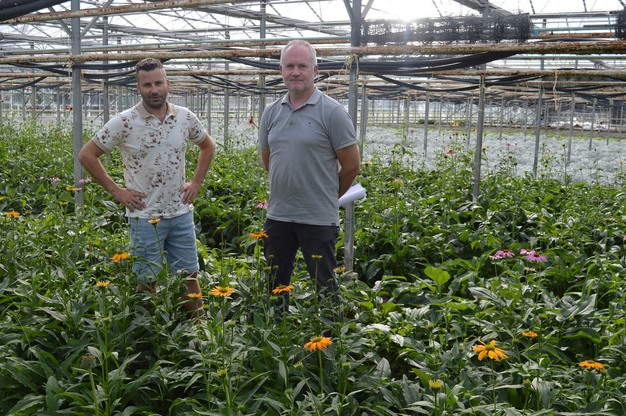
Ruud Batist and Jos van Schie.
3800 kinds of seeds
That was until he began speaking to fellow growers who do things differently. More in tune with nature and focusing on resilience, 'balance,' and 'vitality,' in a more 'organic' way of growing. One of them introduced him to Jos van Schie of Muller Seeds, which sells no less than 3,800 different flower seeds for the professional market.
To make a long story short, the men shared a similar vision of what good cultivation and an interesting market approach look like. They discussed and chose an exclusive assortment of cut flowers, and in February this year, the first of those flowers were sown.

Entirely different approach
The cultivation method is completely different from before, says Ruud. That is mainly due to an entirely different approach. "If I see a pest now, my first reaction is no longer 'what should I do?' It is 'how did it get here?' The biological world is central; everything flies in and out. In the gerbera, we kept supplementing."
"I still encounter lacewings and predatory bugs that are descended from critters I introduced almost a year ago. Especially now that old and young crops are mixed together, and because there's great diversity, everything finds a biological balance more easily. It's also important not to act too impulsively. Not everything always goes well; sometimes you have to let things be, but you then see that nature can also recover," Ruud says.
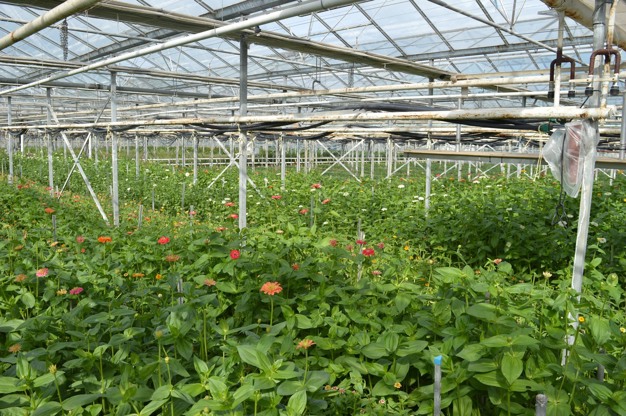
'As sparse as possible'
The soil is excellent, too, perhaps even too nutrient-rich. An amaryllis grower used to occupy the land, and he tilled numerous crops into it over the years. "Some flowers got top-heavy; they actually just had it too good. We sometimes say that you should grow annuals as sparsely as possible."
"Then it uses all its strength to make flowers. The poorer the soil, the more beautiful the flower. But it all generally grows and blooms. We also have products we thought would amount to nothing or that we were too early or too late with, but those surprised us," explains Ruud.
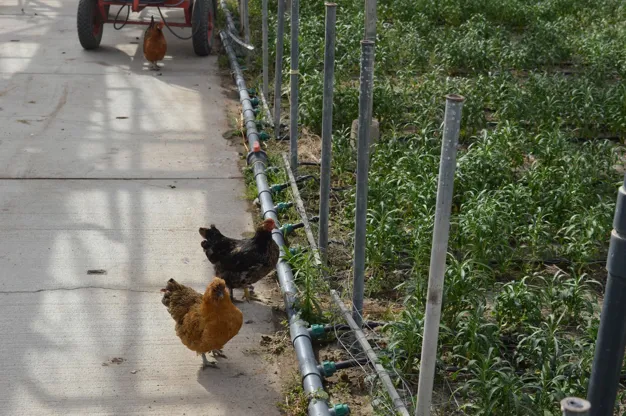
Just after sowing, the chickens must go outside for a while. But after that, they are more than welcome to peck out the weeds and work the soil to their hearts' content.
Two heads are better than one
Ruud and Jos often say 'we,' which says a lot about their working relationship. It is an adventure for both men who have a passion for floriculture and are gaining plenty of knowledge. They deliberated about the range, and Jos closely followed the developments at the nursery, assisting Ruud in word and deed. No two varieties are alike; behind everything lies the question of which products lend themselves to organic cultivation.
And where there is a market for them. "It's a game. We try everything, and if something fails, we look for causes and alternatives. Depending on when you visit, there are 15 to 20 varieties, with some annuals having already made several rounds. I sowed new flowers this week, so we'll see what comes of that. If all goes well, I'll soon have a few species in bloom in the middle of winter."
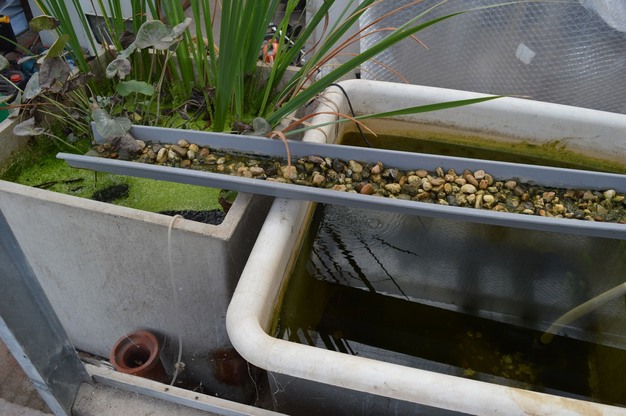
Little ponds with flowing water, water plants, and fish
MPS Natural Protected
Greenhouse cultivation gives you more control of the climate. You can stretch the seasons slightly, omitting the extremes. The men are not unyielding regarding coatings as long as they are natural or make sowing easier (which is useful, for example, with some seeds that are so small they would otherwise easily scatter). Skal certification allows for both. To become a certified organic grower, you must cultivate in the same soil for several years with zero chemicals.
Ruud does not do that; "my flowers are organic," he says. He has just started, and it is not his greenhouse, so using that is difficult for now. It's not the most important thing for Ruud, but it's still a pity "because that surely benefits sales." He hopes to get MPS Natural Protected next year. You can get this new certificate - where the main requirement is that you have used only organic substances - after one year of cultivation.
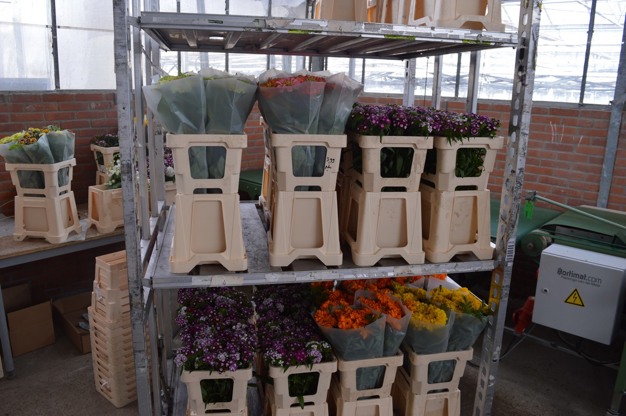
An auction cart, with the flowers packaged in biodegradable sleeves.
This year, Ruud sold all his flowers via auction and focused 100% on growing. Next year, hopefully, some permanent arrangements can be made, which is nice, but until now, was held off. Demand has not been lacking, and Ruud regularly has enthusiastic buyers visiting.
"There was recently one with a cash & carry who already wanted to make a deal. That's obviously great for future sales, but I also want to sell my story: that there's no gas and chemicals involved, that the garden's alive with ponds, birds, chickens, and all kinds of insects, and that the most amazing flowers come out of my Flowergarden," Ruud concludes.
For more information:
Ruud Batist 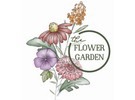 The Flowergarden
The Flowergarden
Email: ruud@theflowergarden.nl
https://theflowergarden.nl/
 Jos van Schie
Jos van Schie
Muller Seeds
Email: Jos@mullerseeds.com
www.mullerseeds.co
